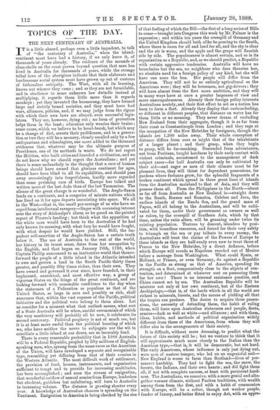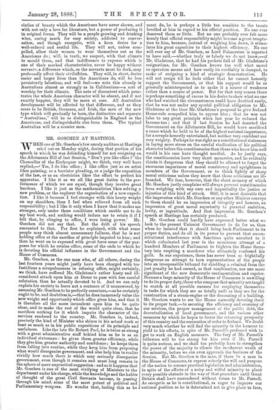TOPICS OF THE DAY.
THE NEXT CENTENARY OF AUSTRALIA.
IT is a little absurd, perhaps even a little impudent, to talk of "the centenary of Australia," when the island- continent must have had a history, if we only knew it, of thousands of years already. The evidence of the mounds of clam-shells on the coast proves beyond question that man has lived in Australia for thousands of years, while the strange tribal laws of the aborigines indicate that their elaborate and burdensome social system must have grown up out of customs of fathomless antiquity. The West, with all its learning, knows not whence they came ; and as they are not formidable, and in obedience to some unknown law dwindle instead of multiplying, it regards them little more than it regards monkeys ; yet they invented the boomerang, they have formed large and strictly bound societies, and they must have had wars, alliances, policies, and, if we may judge from the rigour with which their own laws are obeyed, even successful legis- lators. They are, however, dying out ; no form of protection helps them in the least ; education only wearies their brains ; some cause, which we believe to be heart-break, but which may be a change of diet, arrests their prolificness, and in a genera- tion or two they will be a memory, clearly recalled only by a few antiquarians and ethnologists, one more added to the thousand evidences that, whatever may be the ultimate purpose of Providence, one of its methods is waste. We do not regret the Hittites, who built cities and founded a civilisation, and we do not know why we should regret the Australians ; and yet there is some melancholy in the thought that a race of human beings should have owned that glorious continent for ages, should have been blind to all its capabilities, and should pass away unresistingly into forgetfulness, hardly more regarded than some perishing race of birds. Europe has talked and written more of the last dodo than of the last Tasmanian. The silence of the great change is so wonderful. The Anglo-Saxon lands on a continent, and a congeries of minute nations which has lived on it for ages departs unresisting into space. We all in the West—that is, the small per-centage of us who have es- caped from intellectual savagery—linger with unceasing interest over the story of Atahualpa's alarm as he gazed on the painted report of Pizarro's landing; but think what the apparition of the white man would have been to the Australian if he had only known its meaning, with what fury he would have fought, with what despair he would have yielded. Still, the im- pudent self-assertion of the Anglo-Saxon has a certain truth below it. The use of Australia to the rest of the world, her history in its truest sense, dates from her occupation by the English, and that began on January 26th, 1788, when Captain Phillip announced to an inattentive world that thence- forward the people of a little island in the Atlantic intended to own and govern a land in the South Pacific thirty times greater, and possibly fifty times richer, than their own. They have owned and governed it ever since, have founded, in their haphazard, anarchical, and most effective way, a group of vigorous States on the fringe of the great continent, and are looking forward with reasonable confidence to the day when the statesmen of a Federation as populous as that of the United States, as large in area and possibly as rich, shall announce that, within the vast expanse of the Pacific, political initiative and the political veto belong to them alone. Let us consider for a moment what that outlook means, what sort of a State Australia will be when, amidst ceremonials of which the very machinery will probably all be new, it celebrates its second centenary. Political prophecy is not of much use, but it is at least more useful than the political boasting of which we, who have neither the nerve to subjugate nor the wit to conciliate a little island at our doors, are so incurably fond.
There is every reasonable probability that in 1988 Australia will be a Federal Republic, peopled by fifty millions of English- speaking men, who, sprung from the same races as the American of the Union, will have developed a separate and recognisable type, resembling yet differing from that of their cousins in the Western Atlantic. The most difficult work of settlement, the provision of food, houses, instruments, and organisation sufficient to tempt and to provide for increasing multitudes, has been accomplished ; and soon the stream of emigration, that wonderful outflow of annual armies from Europe, leaderless but obedient, guideless but unfaltering, will turn to Australia in increasing volume. The distance is growing shorter every year. A knowledge of Australian chances is spreading on the Continent. Erdigration to America is being checked by the rise of that feeling of which the Bill—the first of a long series of Bills to come—brought into Congress this week by Mr. Palmer is the expression ; and within ten years the overspill of Germany and the United Kingdom should both alike be pouring to the South, where there is room for all and land for all, and the sky is clear and the air is warm, and the apple and the grape will flourish side by side. The populousness is almost certain, and so is its organisation as a Republic, and, as we should predict, a Republie
with certain aggressive tendencies. Australia will have no boundaries but the sea' no neighbour who dare threaten her, no absolute need for a foreign policy of any kind, but she will have one none the less. Her people will differ from the American. They will not be so entirely agricultural as the Americans were ; they will be horsemen, not gig-drivers ; they will have almost from the first more ambition, and they wilt in many ways have at once a greater largeness of view and more unscrupulousness. Already their foreign policy interests Australians acutely, and their first effort to act as a nation has been to form a fleet. Already they display that curious feeling, so different in different peoples, that distance on water has for them little or no meaning. They never dream of excluding New Zealand from their aggregate, though it is as far from their coast as Constantinople from London ; and they rage at the occupation of the New Hebrides by foreigners, though the islands are 1,200 miles away. Their whole conception of distance differs from ours as might that of the inhabitants of a larger planet ; and their grasp, when they begin to grasp, will be far-reaching. Descended from adventurers, not from Puritans, taught hardness by their early contact with violent criminals, accustomed to the management of dark subject races—for half Australia can only be cultivated by their aid—and eager as men of their climate must be for pleasant lives, they will thirst for dependent possessions, for gardens where fortunes grow, for the splendid fragments of a broken continent which spread in three great lines of islands from the Australian mainland to that of Asia, and they will possess them all. From the Philippines in the North—about as far off from Australia as New Zealand is—straight down to the South, Borneo and Sumatra, Celebes and Java, the endless islands of the Banda Sea, and the grand mass of Papua' will all belong to the Australians, and will be culti- vated for them, under their government as owners as well as rulers, by the overspill of Southern Asia, which by that time, unless the ratio alters, will be groaning under twice its existing population. Teutons by descent, islanders by posi- tion, with boundless resources, and forced for their very safety to triumph on the sea or pay tribute to every enemy, the Australians will treat the claims of the Powers of Europe to these islands as they are half-ready even now to treat those of France to the New Hebrides, by a direct defiance, before which Europe will recede as Napoleon receded out of Mexico before a message from Washington. What could Spain, or Holland, or France, or even Germany, do against a Republic in the Pacific as strong as that of America, spending its strength on a fleet, comparatively close to the objects of con- tention, and determined at whatever cost on possessing them for her own ? There is no internal resistance possible, and China cannot act by sea. The Australian Republic will be mistress not only of her own continent, but of the Eastern Archipelago,—that is, of the lands which in all the world are richest in minerals, forests, and the means of yielding all that the tropics can produce. The desire to acquire these posses- sions, the necessity of defending them, the habit of ruling them, will force upon Australian statesmen and people, fleets, armies—dark as well as white—and alliances ; and with them, ideas, habits, and methods of political organisation widely different from those of the Americans, from whom they will differ also in the arrangements of their society.
It is difficult, without mere dreaming, to predict what the future of this society will be ; but we venture to think that it will approximate much more closely to the Italian than the American type,—that is, it will be democratic, but not hard. The early Americans, whose influence is only just dying out, were men of austere temper, who led on an ungrateful soil— New England is worse to farm than Scotland—lives of per- manent hardship. They had to fight the sea, the snow, the forests, the Indians, and their own hearts ; and did fight them all, if not with complete success, at least with persistent hard- ness. The Australians, we conceive, with a more genial and alto- gether warmer climate, without Puritan traditions with wealth among them from the first, and with a habit of communion with Europe, will be a softer, though not weaker people, fonder of luxury, and better fitted to enjoy Art, with an appre-
elation of beauty which the Americans have never shown, and with not only a love for literature, but a power of producing it in original forms. They will be a people growing and drinking wine, caring much for easy society, addicted to conver- sation, and though energetic, with a keen desire for a well-ordered and restful life. They will not, unless com- pelled, allow their women to wear themselves out as the Americans do ; will, in truth, we suspect, with that climate to mould them, and that indifference to expense which is one of their marked characteristics, never be happy without servants, a difference which, as the servants must be dark, may profoundly affect their civilisltion. They will, in short, desire easier and larger lives than the Americans do, will be less persistently laborious, and will feel—we note this already in Australians almost as strongly as in Californians—a sort of worship for their climate. The note of discontent which pene- trates the whole American character will be absent, and if not exactly happier, they will be more at ease. All Australian development will be affected by that difference, and as they cease to be British, Germans, and Irish, the men of the new type which will gradually be born, the distinctive and separate "Australians," will be as distinguishable in England as the Americans, and distinguishable also from them. The typical Australian will be a sunnier man.



















































 Previous page
Previous page